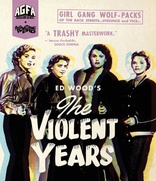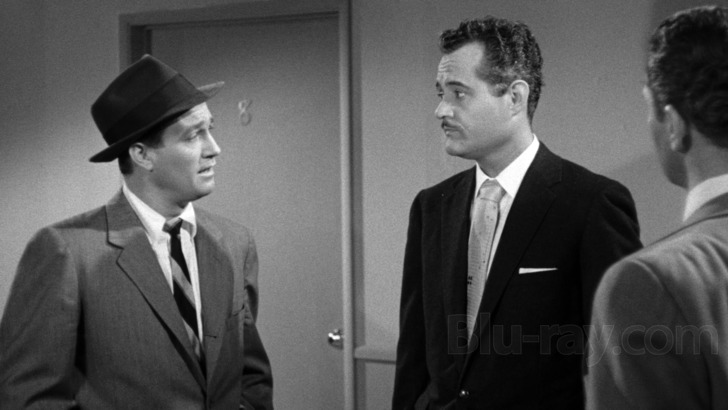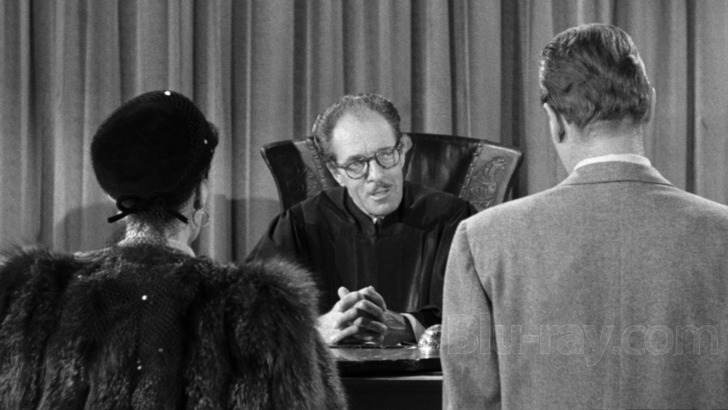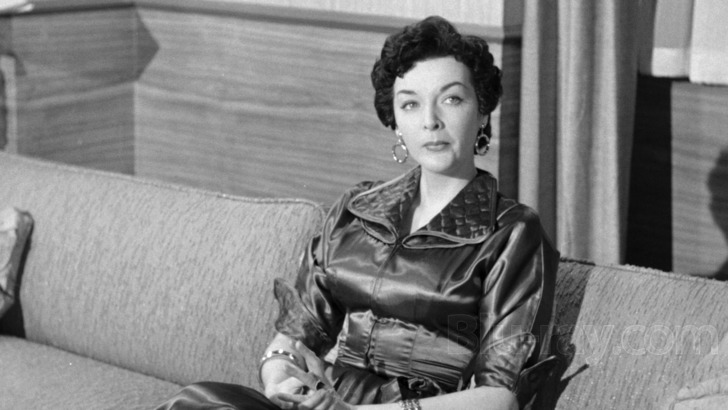The Violent Years Blu-ray Movie
HomeThe Violent Years Blu-ray Movie 
AGFA | 1956 | 2 Movies | 65 min | Not rated | Nov 21, 2017
Movie rating
5.5 | / 10 |
Blu-ray rating
| Users | 0.0 | |
| Reviewer | 2.0 | |
| Overall | 2.0 |
Overview
The Violent Years (1956)
Paula Parkins is the teenage daughter of wealthy parents whom don't seem to make time for her, so she looks for thrills as the leader of her all girl gang who steal, rob, and rape young men.
Starring: Jean Moorhead, Barbara Weeks, Art Millan, I. Stanford Jolley, Timothy FarrellDirector: William Morgan
| Film-Noir | Uncertain |
| Crime | Uncertain |
Specifications
Video
Video codec: MPEG-4 AVC
Video resolution: 1080p
Aspect ratio: 1.78:1
Original aspect ratio: 1.85:1
Audio
English: DTS-HD Master Audio 2.0
Subtitles
English SDH
Discs
Blu-ray Disc
Single disc (1 BD)
Playback
Region A, B (C untested)
Review
Rating summary
| Movie | 2.0 | |
| Video | 3.5 | |
| Audio | 3.5 | |
| Extras | 2.5 | |
| Overall | 2.0 |
The Violent Years Blu-ray Movie Review
Reviewed by Jeffrey Kauffman November 23, 2017The Best Years of Our Lives documented the bittersweet reality of what really should have been an unqualified “happily ever after” moment, namely the return back home by World War II veterans who had survived the carnage. It was part of the Academy Award winning William Wyler masterpiece’s elegance, though, that it quite clearly depicted some of the simmering discontent wafting through the general zeitgeist of the era, despite the fact that the fighting had ended and peace supposedly could reign forevermore (yeah, right — we know how that one worked out). But even taken with its melancholic aspects, The Best Years of Our Lives was a kind of cinematic benchmark that seemed to suggest that happiness was available, despite various obstacles being thrown in the path by the vagaries of fate. Of course, that was before the Baby Boom set in, and while it doesn’t officially deal with those born after World War II, by the time films like Blackboard Jungle and Rebel Without a Cause came along (both notably in 1955), it was becoming evident that while vets and their spouses might be putting the pieces back together again, their kids were just as busy deconstructing everything, as if to say, “You thought World War II was bad?” The rise of so-called juvenile delinquency became something of a cinematic staple in the 1950s, and there are any number of films which traverse more or less the same general territory, with out of control teenagers manifesting behaviors which are often blamed squarely on under involved parents. In fact 1958’s The Party Crashers had a tagline asking, “Who are the delinquents — kids or their “respectable” parents?” (For those interested who can track down a copy, The Party Crashers has some interest in the casting department, being the final feature film of both Frances Farmer and Bobby Driscoll, here playing mother and son.) The Violent Years is in some ways very much in line with some of its “JD” siblings from this same general timeframe, but as might be gleaned from the fact that it was written by the inimitable Edward D. Wood, Jr. (that’s Ed Wood, in case some aren’t aware), the film has an unabashedly gonzo quality that may recommend it to certain jaded types who may have seen the film skewered on an episode of Mystery Science Theater 3000.

One of The Violent Years’ supposed “innovations” is that it deals with a so-called girl gang, something that puts it at least somewhat in league with another staple of fifties B-movies, the “women in prison” genre. Paula Parkins (Jean Moorhead) is a “typical” middle class teenager in some generic American town, one coddled in terms of physical blandishments by her status conscious mother Jane (Barbara Weeks) and journalist father Carl (Arthur Millan). Unlike films such as Rebel Without a Cause, The Violent Years doesn’t really document any major discontent brewing in the main family dynamic, and in fact it seems that Paula and Jane have a pretty solid mother — daughter relationship. But Paula’s kind of a nasty one, when you get right down to it, and without proper “guidance” from her parental units, she’s become the risk taking grand doyenne of a gang of girl thugs who tool around town doing things like robbing gas stations and (in one of the film’s more salacious subplots) more or less sexually assaulting men.
As probably should come as no great surprise to any fan of Ed Wood, The Violent Years is not exactly an exercise in narrative subtlety, and so Paula and her acolytes pretty much just go for the gusto for no really discernable reason. And in fact it’s one of the film’s kind of silly formulations that Paula’s parents lavish her with all the comforts of a solid middle class American existence, but because they don’t lavish her with actual attention that she drifts into villainy that ultimately includes not one but several murders.
The whole thing is so patently hyperbolic, something that’s combined with a kind of wooden acting style by just about everyone, that it’s almost impossible to watch the film without bursting into laughter at several key junctures. There’s the same sort of deliriously salacious quality that informs other Wood efforts like Glen or Glenda, but the film is notably lacking that peculiar Woodian “style” that makes so many of his films so oddly enjoyable (this film was directed by William Morgan, though the commentators suggest it was “photographed” rather than actually “directed”, perhaps one salient clue as to the general tenor of the proceedings).
One element that does come through as more “authoritatively” Woodian is the film’s almost earnest sweetness when dealing with some pretty smarmy material. Wood seems to have been an almost genetic optimist, even when dealing with fairly unsavory characters and situations, and that peculiar disconnect is part of The Violent Years’ kind of crazy quilt ambience.
The Violent Years Blu-ray Movie, Video Quality 

The Violent Years is presented on Blu-ray courtesy of the American Genre Film Archive with an AVC encoded 1080p transfer in 1.78:1. AGFA's insert booklet contains the following information on the transfers of the two films included on this disc:
The Violent Years is presented in its original aspect ratio of 1.85:1 (Note: as can be seen in the screenshots accompanying this review, the transfer is actually in 1.78:1). This new digital transfer was created in 4K resolution on a Lasergraphics film scanner from the original 35mm camera negative.It's perhaps notable that there's no information in the above verbiage about restoration efforts (typically including the rote phrase of eliminating or minimizing thousands of instances of dirt, debris and other damage), for The Violent Years looks very much like a raw scan without much "tweaking" having been done. As such, the "basic data" here looks fine, with a generally nicely organic presentation and at least decent detail levels, but there is still a lot of damage to be seen. There are a number of different issues that crop up with fair regularity, including relatively minor issues like scratches, but then moving up the damage scale to things like chunks of frames missing, or indeed even entirely missing frames. This pretty recurrent damage may only add to the "charm" of the viewing experience for some viewers. There are noticeable variances in sharpness, brightness and contrast throughout the presentation, but the single biggest hurdle for some videophiles will probably be the recurrent age related wear and tear.
Anatomy of a Psycho is presented in its original aspect ratio of 1.85:1 (Note: this film, too, is also presented in 1.78:1). This new digital transfer was created in 2K resolution on a Lasergraphics film scanner from an original 35mm theatrical print.
Color grading was performed with DaVinci Resolve. Every effort has been made to retain the original theatrical experience of the films. The monaural soundtracks were remastered using Pro Tools HD. The digital transfers were performed by the American Genre Film Archive in Austin, TX.
The Violent Years Blu-ray Movie, Audio Quality 

The Violent Years features a DTS-HD Master Audio 2.0 mono track that may not have quite the prevalence of age related wear and tear as the video element does, but which still has a somewhat shallow and boxy sound throughout. Part of the film's weird allure is the near monotone that several characters repeatedly speak in, and so the film's whole soundtrack has a kind of flat aspect without a ton of "affect". There are occasional brief "jumps" here keyed to things like missing frames, but on the whole, everything comes through with acceptable if never outstanding quality.
The Violent Years Blu-ray Movie, Special Features and Extras 

- Commentary Track features filmmaker Frank Henenlotter and Ed Wood biographer Rudolph Grey and is a lot of fun if occasionally NSFW.
- The Violent Years Original Theatrical Trailer (1080p; 2:23)
- Gutter Noir Trailers from the Something Weird Vault (1080p; 15:14) will be a treasure trove of sorts for some genre aficionados.
- Hellborn (1080p; 10:02) offers (silent) footage from an aborted Ed Wood feature that was shot after The Violent Years. This is sourced from a very rough looking VHS master, but does offer the added allure (?) of seeing Wood in drag.
- Bonus Movie: Anatomy of a Psycho (1080p; 1:13:48). This is another film which evidently had at least some input from Wood on the screenplay, though the film's title would seem to be a bit outsized (and perhaps meant to evoke memories of Hitchcock's classic from the previous year). The story purportedly explores the mental breakdown of a kid whose brother is already a convicted killer.
The Violent Years Blu-ray Movie, Overall Score and Recommendation 

The Violent Years is Grade Z material, but as with so many other films that had at least some input from Ed Wood, it has a kind of delirious quality that will appeal to certain connoisseurs of the outré. To call the performances wooden is maybe an insult to trees, but the basic plotline and some of the vignettes are amped up to presentational degrees that may only become more hilarious to some viewers due largely in part to the performance acumen (or lack thereof) of the actors. AGFA offers a presentation that can't overcome some deficiencies in the source, but they've also provided some appealing supplements to help sweeten the pot. Technical merits have (understandable) hurdles at times for those considering a purchase.
Similar titles
Similar titles you might also like

River's Edge
1986

The Hitch-Hiker
1953

Trick
2019

The Shed
2019

Scary Stories to Tell in the Dark 4K
2019

3 from Hell 4K
2019

Don't Knock Twice
2017

The Last House on the Left
2009

Sometimes Aunt Martha Does Dreadful Things
Standard Edition
1971

Messenger of Death
1988

Psycho a Go-Go
1965

Lady Street Fighter
w/ Revenge of the Street Fighter
1981

Machine Gun McCain
Gli Intoccabili
1969

Julie Darling
1983

The Black Gestapo
Black Enforcers / Ghetto Warriors
1975

Hounds of Love
2016

Killer's Moon
Remastered Edition
1978

Lady Cocoa
Pop Goes the Weasel
1975

Five Steps to Danger
5 Steps to Danger
1957

The Enforcer
1951
